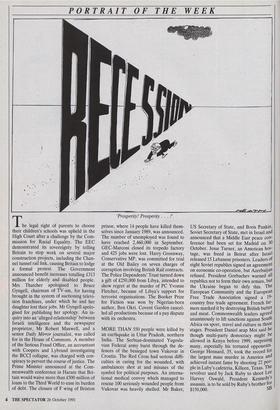PORTRAIT OF THE WEEK
The legal right of parents to choose their children's schools was upheld in the High Court after a challenge by the Com- mission for Racial Equality. The EEC demonstrated its sovereignty by telling Britain to stop work on several major construction projects, including the Chan- nel tunnel rail link, causing Britain to lodge a formal protest. The Government announced benefit increases totalling £313 million for elderly and disabled people. Mrs Thatcher apologised to Bruce Gyngell, chairman of TV-am, for having brought in the system of auctioning televi- sion franchises, under which he and her daughter lost their jobs. Mr Gyngell apolo- gised for publishing her apology. An in- quiry into an 'alleged relationship' between Israeli intelligence and the newspaper proprietor, Mr Robert Maxwell, and a senior Daily Mirror journalist, was called for in the House of Commons. A member of the Serious Fraud Office, an accountant with Coopers and Lybrand investigating the BCCI collapse, was charged with con- spiracy to pervert the course of justice. The Prime Minister announced at the Com- monwealth conference in Harare that Bri- tain would waive more than £500 million of loans to the Third World to ease its burden of debt. The closure of F wing of Brixton `Prosperity! Prosperity . . . !'
prison, where 14 people have killed them- selves since January 1989, was announced. The number of unemployed was found to have reached 2,460,000 in September. GEC-Marconi closed its torpedo factory and 425 jobs were lost. Harry Greenway, Conservative MP, was committed for trial at the Old Bailey on seven charges of corruption involving British Rail contracts. The Police Dependents' Trust turned down a gift of £250,000 from Libya, intended to show regret at the murder of PC Yvonne Fletcher, because of Libya's support for terrorist organisations. The Booker Prize for Fiction was won by Nigerian-born author, Ben Okri. Covent Garden cancel- led all productions because of a pay dispute with its orchestra.
MORE THAN 550 people were killed by an earthquake in Uttar Pradesh, northern India. The Serbian-dominated Yugosla- vian Federal army burst through the de- fences of the besieged town Vukovar in Croatia. The Red Cross had serious diffi- culties in caring for the wounded, with ambulances shot at and misuses of the symbol for political purposes. An interna- tional medical convoy which managed to rescue 100 seriously wounded people from Vukovar was heavily shelled. Mr Baker, US Secretary of State, and Boris Pankin, Soviet Secretary of State, met in Israel and announced that a Middle East peace con- ference had been set for Madrid on 30 October. Jesse Turner, an American hos- tage, was freed in Beirut after Israel released 15 Lebanese prisoners. Leaders of eight Soviet republics signed an agreement on economic co-operation, but Azerbaijan refused. President Gorbachev warned all republics not to form their own armies, but the Ukraine began to defy this. The European Community and the European Free Trade Association signed a 19- country free trade agreement. French far- mers marked it by destroying British butter and meat. Commonwealth leaders agreed unanimously to lift sanctions against South Africa on sport, travel and culture in three stages. President Daniel arap Moi said he though multi-party democracy might be allowed in Kenya before 1999, surprising many, especially his tortured opponents. George Hennard, 35, took the record for the largest mass murder in America and achieved instant fame by shooting 22 peo- ple in Luby's cafeteria, Killeen, Texas. The revolver used by Jack Ruby to shoot Lee Harvey Oswald, President Kennedy's assassin, is to be sold by Ruby's brother for








































 Previous page
Previous page